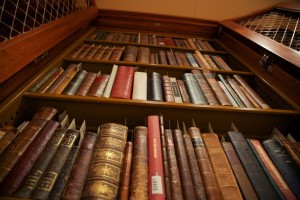When you think about the history of women working outside the home, who comes to mind? Florence Nightingale? Rosie the Riveter? Maybe slave women?
Well, imagine this: it’s the year 1478, less than 40 years after Gutenberg invented the printing press. And a woman is a setting type in one of the very first publishing houses.
And then think of this: less than 20 years later, one of the earliest collections of women’s biographies was published. A group of nuns — tenacious women who aspired to travel and make a difference outside of the usual bounds of home and family– got a copy of the book. They used the wide margins to make notations. They read and notated extensively, especially the part about >>Pope Joan, the female pope of legend.
Centuries later, these documents and more than 8,000 others amazingly still exist — books, manuscripts, business cards, illustrations, fliers, Virginia Woolf’s writing desk, and even a $2.00 bill signed by the woman who was the official printer for the colony of Maryland in 1774. These are all all testament to the lives of extraordinary women, artists, scientists, and revolutionaries — the earliest feminists.
These documents can all be found at the Sallie Bingham Center of the Rubinstein Library at Duke University in Durham, NC. The collection of books was donated by Lisa Unger Baskin last fall. As she says, the collection is proof positive that “women have always been productive and working people and this history essentially has been hidden.”
Baskin began collecting materials on women’s history in the 1960’s after attending Cornell University. She and her husband were avid book collectors and also founded one of the preeminent American private presses of the 20th century.
Almost 700 years of women’s history are included, from an Italian manuscript written in 1240 that documents a respite home for women to a large collection of letters and manuscripts by the 20th century anarchist Emma Goldman.
The collection includes many firsts — the first book typeset by a woman, the first book of poetry written by a French woman, the first book on obstetrics written by a woman, one of the first books illustrated by a woman, illustrated books by the female naturalist who was the first person to observe the metamorphosis of insects.
Almost 400 letters and manuscripts relate to the “Ladies of Llangollen.” The Ladies were two upper class lesbians from Ireland who eloped to Northern Wales together just two years after the start of the American Revolution. Their life scandalized and fascinated the outside world and attracted visitors from around Europe.
The anti-slavery movement in England and the US is another focus of the collection, including a wonderful letter from Harriet Beecher Stowe (author of Uncle Tom’s Cabin) to support Sojourner Truth’s autobiography(1850). Truth requested the letter to help support sales of her book.
Baskin’s interest in book collecting and women’s history has resulted in a truly unique collection. She says her hope is that the collection will “help to transform and enlarge the notion of what history is about.”
The Collection is housed at the Rubenstein Library of Rare Books at Duke and will be available to researchers once it has been catalogued, which is expected to take several years. Some items will be on display in the Library at the end of August, 2015.
>> Janet Colm is the founder and former CEO of Planned Parenthood of Central North Carolina. She was arrested as part of the Moral Monday protests in July 2013 and lives in Chatham County, NC.
Janet Colm is the founder and former CEO of Planned Parenthood of Central North Carolina. She was arrested as part of the Moral Monday protests in July 2013 and lives in Chatham County, NC.

They also have a fantastic collection of women’s reproductive health related items – including papers from some of the earliest legal abortion providers in N.C. And a great collection of LGBT history.